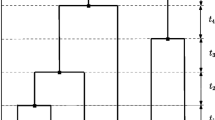Abstract
The evolutionary distance between two organisms can be determined by comparing the order of appearance of orthologous genes in their genomes. Above the numerous parsimony approaches that try to obtain the shortest sequence of rearrangement operations sorting one genome into the other, Bayesian Markov chain Monte Carlo methods have been introduced a few years ago. The computational time for convergence in the Markov chain is the product of the number of needed steps in the Markov chain and the computational time needed to perform one MCMC step. Therefore faster methods for making one MCMC step can reduce the mixing time of an MCMC in terms of computer running time.
We introduce two efficient algorithms for characterizing and sampling transpositions and inverted transpositions for Bayesian MCMC. The first algorithm characterizes the transpositions and inverted transpositions by the number of breakpoints the mutations change in the breakpoint graph, the second algorithm characterizes the mutations by the change in the number of cycles. Both algorithms run in O(n) time, where n is the size of the genome. This is a significant improvement compared with the so far available brute force method with O(n 3) running time and memory usage.
Preview
Unable to display preview. Download preview PDF.
Similar content being viewed by others
References
Sturtevant, A.H., Novitski, E.: The homologies of chromosome elements in the genus Drosophila. Genetics 26, 517–541 (1941)
Nadau, J.H., Taylor, B.A.: Lengths of chromosome segments conserved since divergence of man and mouse. PNAS 81, 814–818 (1984)
Palmer, J.D., Herbon, L.A.: Plant mitochondrial DNA evolves rapidly in structure, but slowly in sequence. J. Mol. Evol. 28, 87–97 (1988)
Bader, D.A., Moret, B.M.E., Yan, M.: A linear-time algorithm for computing inversion distance between signed permutations with an experimental study. J. Comp. Biol. 8(5), 483–491 (2001)
Bergeron, A.: A very elementary presentation of the Hannenhalli-Pevzner theory. In: Amir, A., Landau, G.M. (eds.) CPM 2001. LNCS, vol. 2089, pp. 106–117. Springer, Heidelberg (2001)
Hannenhalli, S., Pevzner, P.A.: Transforming Cabbage into Turnip: Polynomial Algorithm for Sorting Signed Permutations by Reversals. J. ACM 46(1), 1–27 (1999)
Kaplan, H., Shamir, R., Tarjan, R.: A faster and simpler algorithm for sorting signed permutations by reversals. SIAM J. Comput. 29(3), 880–892 (1999)
Siepel, A.: An algorithm to find all sorting reversals. In: Proc. RECOMB 2002, pp. 281–290 (2002)
Tannier, E., Sagot, M.-F.: Sorting by reversals in subquadratic time. In: Sahinalp, S.C., Muthukrishnan, S.M., Dogrusoz, U. (eds.) CPM 2004. LNCS, vol. 3109, pp. 1–13. Springer, Heidelberg (2004)
Hannenhalli, S.: Polynomial algorithm for computing translocation distance between genomes. In: Hirschberg, D.S., Meyers, G. (eds.) CPM 1996. LNCS, vol. 1075, pp. 168–185. Springer, Heidelberg (1996)
Bafna, V., Pevzner, A.: Sorting by transpositions. SIAM J. Disc. Math. 11(2), 224–240 (1998)
Berman, P., Hannenhalli, S., Karpinski, M.: 1.375-Approximation Algorithm for Sorting by Reversals. In: Möhring, R.H., Raman, R. (eds.) ESA 2002. LNCS, vol. 2461, pp. 200–210. Springer, Heidelberg (2002)
Eriksen, N.: (1+ε)-approximation of sorting by reversals and transpositions. In: Gascuel, O., Moret, B.M.E. (eds.) WABI 2001. LNCS, vol. 2149, pp. 227–237. Springer, Heidelberg (2001)
Gu, Q.-P., Peng, S., Sudborough, H.I.: A 2-Approximation Algorithm for Genome Rearrangements by Reversals and Transpositions. Theor. Comp. Sci. 210(2), 327–339 (1999)
Kececioglu, J.D., Sankoff, D.: Exact and Approximation Algorithms for Sorting by Reversals, with Application to Genome Rearrangement. Algorithmica 13(1/2), 180–210 (1995)
Blanchette, M., Kunisawa, T., Sankoff, D.: Parametric genome rearrangement. Gene. 172, GC11–GC17 (1996)
Bader, M., Ohlebusch, E.: Sorting by weighted reversals, transpositions and inverted transpositions. In: Apostolico, A., Guerra, C., Istrail, S., Pevzner, P.A., Waterman, M. (eds.) RECOMB 2006. LNCS (LNBI), vol. 3909, pp. 563–577. Springer, Heidelberg (2006)
Larget, B., Simon, D.L., Kadane, B.J.: Bayesian phylogenetic inference from animal mitochondrial genome arrangements. J. Royal Stat. Soc. B 64(4), 681–695
York, T.L., Durrett, R., Nielsen, R.: Bayesian estimation of inversions in the history of two chromosomes. J. Comp. Biol. 9, 808–818 (2002)
Larget, B., Simon, D.L., Kadane, J.B., Sweet, D.: A Bayesian analysis of metazoan mitochondrial genome arrangements Mol. Biol. Evol. 22(3), 486–495 (2005)
Durrett, R., Nielsen, R., York, T.L.: Bayesian estimation of genomic distance. Genetics 166, 621–629 (2004)
Miklós, I.: MCMC Genome Rearrangement. Bioinformatics 19, ii130–ii137 (2003)
Miklós, I., Ittzés, P., Hein, J.: ParIS genome rearrangement server. Bioinformatics 21(6), 817–820 (2005)
Miklós, I., Hein, J.: Genome rearrangement in mitochondria and its computational biology. In: Lagergren, J. (ed.) RECOMB-WS 2004. LNCS (LNBI), vol. 3388, pp. 85–96. Springer, Heidelberg (2005)
Metropolis, N., Rosenbluth, A.W., Rosenbluth, M.N., Teller, A.H., Teller, E.: Equations of state calculations by fast computing machines. J. Chem. Phys. 21(6), 1087–1091 (1953)
Liu, J.S.: Monte Carlo strategies in scientific computing. Springer Series in Statistics, New-York (2001)
Hastings, W.K.: Monte Carlo sampling methods using Markov chains and their applications. Biometrika 57(1), 97–109 (1970)
von Neumann, J.: Various techniques used in connection with random digits. National Bureau of Standards Applied Mathematics Series 12, 36–38 (1951)
Author information
Authors and Affiliations
Editor information
Editors and Affiliations
Rights and permissions
Copyright information
© 2006 Springer-Verlag Berlin Heidelberg
About this paper
Cite this paper
Miklós, I., Paige, T.B., Ligeti, P. (2006). Efficient Sampling of Transpositions and Inverted Transpositions for Bayesian MCMC. In: Bücher, P., Moret, B.M.E. (eds) Algorithms in Bioinformatics. WABI 2006. Lecture Notes in Computer Science(), vol 4175. Springer, Berlin, Heidelberg. https://doi.org/10.1007/11851561_17
Download citation
DOI: https://doi.org/10.1007/11851561_17
Publisher Name: Springer, Berlin, Heidelberg
Print ISBN: 978-3-540-39583-6
Online ISBN: 978-3-540-39584-3
eBook Packages: Computer ScienceComputer Science (R0)




